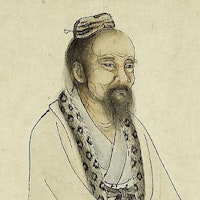The truly wise man, considering both sides of the question without partiality, sees them both in the light of Tao.
The truly wise man, considering both sides of the question without partiality, sees them both in the light of Tao.
Chuang Tzu

In the Light of the Tao
Topic: Truth, Law, & Principle
When we wear out our minds, stubbornly clinging to one partial view of things, refusing to see a deeper agreement between this and its complementary opposite, we have what is called “three in the morning.”
What is this “three in the morning?”
A monkey trainer went to his monkeys and told them:
“As regards your chestnuts: you are going to have three measures in the morning and four in the afternoon.”
At this they all became angry. So he said: “All right, in that case I will give you four in the morning and three in the afternoon.” This time they were satisfied.
The two arrangements were the same in that the number of chestnuts did not change. But in one case the animals were displeased, and in the other they were satisfied. The keeper had been willing to change his personal arrangement in order to meet objective conditions. He lost nothing by it!
The truly wise man, considering both sides of the question without partiality, sees them both in the light of Tao.
This is called following two course at once.
Chuang Tzu, also known as Zhuang Zhou or Zhuangzi, was a luminous presence in an era of transformative thought. He lived around 350 BC, a time of remarkable intellectual ferment in China. As a Taoist philosopher, he embraced a worldview that emphasized balance, the rhythm of nature, and the pursuit of a deeply personal understanding of the universe. His teachings centered on the Tao, a profound concept that represented the underlying order and essence of the cosmos. Unraveling the mystery of the Tao was not about conquering or controlling it, but rather about aligning oneself with its fluid, natural ebb and flow.
Over the millennia, Chuang Tzu's wisdom has been distilled into a collection of sayings, passed down from generation to generation. These teachings, written with a depth and eloquence that resonates across the ages, offer a profound and transformative exploration of existence and our place within it. They invite us to question conventional wisdom, to see the world from different perspectives, and to embrace the inherent uncertainties of life. In their enchanting simplicity and their profound depth, Chuang Tzu's words hold a mirror to our deepest selves, asking us to reflect on who we are and how we relate to the world around us.
These timeless teachings of Chuang Tzu have found resonance far beyond the Taoist tradition. They have become one of the fundamental sources for Zen Buddhism, a spiritual path that shares Taoism's emphasis on mindfulness, simplicity, and the pursuit of enlightenment through direct experience. In this way, Chuang Tzu's legacy reaches across the centuries, touching lives and shaping philosophies far beyond the borders of his own time and place. His wisdom continues to illuminate the path for those seeking understanding, inviting us all to engage deeply with the mysteries of existence and our place within the cosmos.
Three in the Morning
Merton, Thomas. The Way of Chuang Tzu. New Directions Books, 2010, p. 44 [The Way of Chuang Tzu, Thomas Merton (New Directions Books)].

Chuang Tzu
Theme: The Light of Truth

Thomas Merton, The Way of Chuang Tzu
Three in the Morning
Thomas Merton, The Way of Chuang Tzu
The Dalai Lama at the Abbey of Gethsemani in 1996
Resources
Related Quotes
Copyright © 2017 – 2026 LuminaryQuotes.com About Us